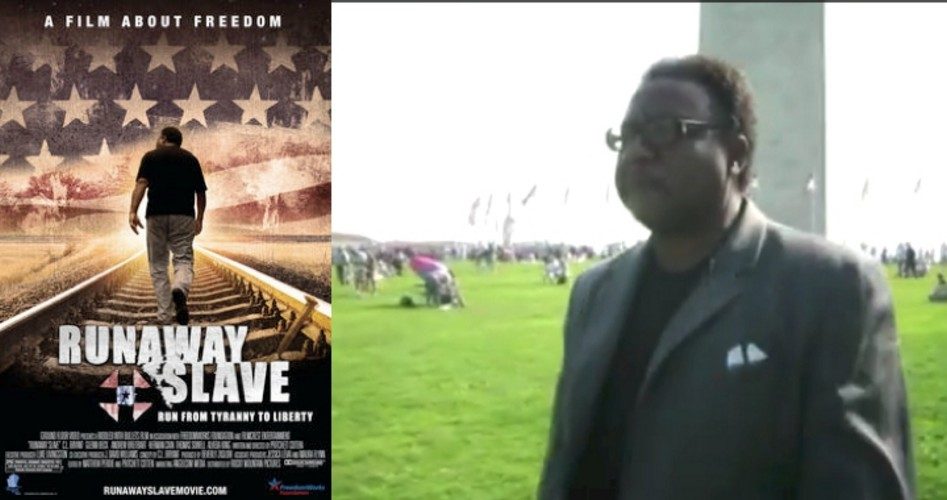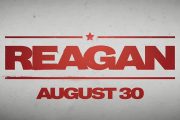
Someone has finally produced a documentary challenging the dominant thinking in America about race, particularly the notion that the Welfare State helps emancipate minorities from the slavery of poverty. In partnership with FreedomWorks and Ground Floor Video, black leader C.L. Bryant, a former NAACP chapter leader and Democrat liberal, has produced Runaway Slave. This 108-minute film posits the idea that black Americans, by buying into progressivism, and the mindset of entitlements, have traded one form of slavery for another.
Bryant, a Baptist minister and Tea Party leader opens the film by asking if African Americans, nearly a half century after Martin Luther King proclaimed “Free at last!” are indeed free. And why, he ponders, are they still angry? His search for the answer forms the basis of this film as he travels from one coast to the other interviewing black Americans, activists, political and religious leaders and popular personalities — most claiming to be conservative.
The title Runaway Slave draws on the historical concept of American slaves in the mid-19th century escaping from slavery, usually on a southern plantation, and escaping to freedom via the “underground railroad.” Bryant and the film’s producers use the term to call American blacks to become modern runaway slaves, and leave behind the domination of not only welfare and entitlements, but the rhetoric of divisive black leaders who promote hatred and violence as the way to gain equality.
Bryant also recounts part of his own personal story. Early in his career, when he was asked by the NAACP to endorse an agenda that included abortion, he found his political philosophy in conflict with his faith, and marks that realization as the beginning of his journey to conservatism. He now believes that the only hope for America lies in limited government, self-reliance, freedom, and fiscal and individual responsibility.
But his film goes beyond a stirring message of hope, and documents some of the historical events that led to the current oppressive and tyrannical welfare system that has shackled modern American blacks to the system. In one segment, he reminds blacks that the Republican Party, despised by many African Americans, was actually the party that first attempted to legislate improvements for blacks. The film then recaps the disingenuous history of President Lyndon B. Johnson’s stance on race. Johnson opposed civil rights legislation put forward by President Eisenhower in the 1950s, then less than a decade later, championed an enormous civil rights measure that implemented his Great Society. A contemporary black leader in the film claims that Johnson’s legislation “single-handedly destroyed the black family,” an event from which black America has never recovered.
Bryant’s claim that African Americans are still mentally enslaved is a thought shared by many other black leaders. In support of the film’s premise that American blacks are living in modern slavery, former presidential candidate Herman Cain is heard in the film claiming “The size, and scope, and reach of government is the new plantation.” And Star Parker, famous for having made a personal transformation from being dependent on welfare to a crusader for conservatism, called the welfare mentality a form of covetousness.
Throughout the film, the destruction of the family is singled out as a major problem facing the black community. When Johnson’s Great Society offered monetary assistance to single mothers in the 1960s, with the stipulation that “there was no man in the home,” irreparable damage was done to generations who were destined to become institutionalized and dependent on welfare.
But in spite of the problems faced by the black community, many are coming up with solutions. Runaway Slave included an interview with Reverend Jesse Lee Peterson of Los Angeles. Peterson is the founder of BOND (The Brotherhood Organization of a New Destiny), dedicated helping young men to regain control of their lives, “rebuilding the family by rebuilding the man.” Meaty interviews with economist Thomas Sowell, talk show host David Webb, Florida Congressman Allen West, Alveda King, and Timothy Johnson, founder of the Frederick Douglass Foundation (committed to bring limited government and free market solutions to today’s problems.)
To say that Runaway Slave is an engaging film is to do it an injustice. It is a skillful piece of filmmaking, both thought-provoking and invigorating. The interviews with more than a score of intelligent and articulate black leaders are substantive and are expertly executed. And although the film addresses the racial problems of our day, it does so without dwelling on them and applies critical thinking to come up with solutions. It presents sound arguments for conservatism and backs them up. And, while it is driven by the human emotions that long for freedom and dignity, it does so without being sappy. This reviewer found the jittery editing style to be distracting, but the film is a powerful one.
And although documentaries answer to a different standard than narrative films, we still call the characters to be believable. And Bryant is certainly that. One would find it difficult indeed to believe that he was other than what he claims — a black man who has ceased to see himself as a black American, but as an American in fear for his country. And certainly, the thoughtful viewer will understand that freedom and dignity are threatened — not only for blacks but for all Americans.
The film concludes hopefully, with Bryant calling himself a runaway slave, and encouraging others to run away from the tyranny of government, of welfare, of dependence, and toward freedom, saying he will live free, or die.
If there is any criticism to be offered about this film it is that the deliberate use of racial oppression in America’s history could not be fully explored. But Bryant comes to the same conclusion anyway — that we are all in the same boat and cannot survive as a nation until sanity and reason return to government.
This documentary is in limited release and carries a PG rating, probably because of racial content. It is free of gratuitous situations and language, and its uplifting message is nothing less than powerful and refreshing. If it comes to your city, don’t debate, just see it.



